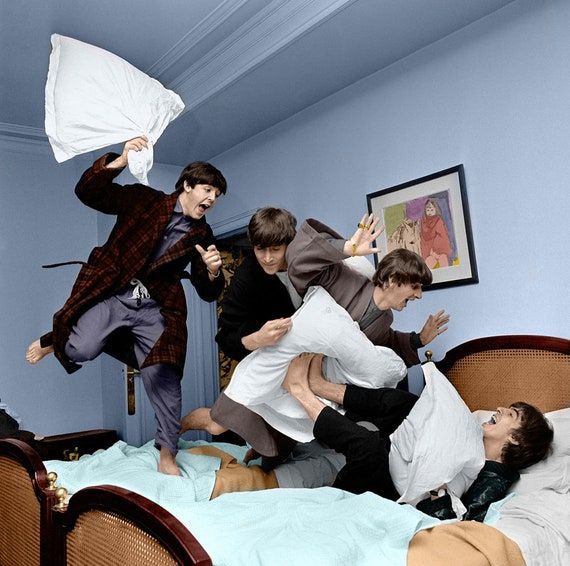As much as music has helped many of us, providing a natural remedy for life’s daily struggles, there’s no denying that it’s also a breeding ground for some of the world’s most insidious subjects. Behind the likes of the obvious, like the abominable Gary Glitter, some of the biggest, most squeaky-clean names have created some truly problematic songs.
Music wields the remarkable ability to forge global connections, harmonising diverse people and dismantling societal divisions that would otherwise remain impossible. Nevertheless, concealed within the cornerstones of even our most loved musical figures lie threads of discourses fraught with unsettling lyrics and disconcerting subject matter.
In hindsight, comprehending how a multitude of these artists managed to evade accountability for their reprehensible remarks out in the open remains a mystery. Yet, the prevailing cultural context at the time facilitated the unchecked prevalence of these notions, fostering an environment where such ideas held sway without even eliciting a hint of scepticism.
However, in today’s landscape, propelled by platforms like social media, an array of voices resonates deeper, and those who stand in opposition carry a heightened influence. The inclusion of derogatory terms in contemporary songs now exposes them to the unrelenting grip of cancel culture, a phenomenon that, while sombre, serves as a vital reckoning.
In the past, adopting such behaviour often carried an air of trendiness, a notion that now appears absolutely ludicrous in light of the potential harm inflicted upon people. While prejudice and bigotry persist in the industry to this day, there are specific instances in history that, when revisited in 2023, truly make you wonder how these songs made it through.
Let’s take a look at some of the culprits.
10 problematic songs that aged terribly:
In 1981, rock musician Ted Nugent released his second album, Intensities in 10 Cities. Among the ten songs on the album, ‘Jailbait’ has gone down as one of the most controversial songs not only in his discography but in music history.
Basically, the song discusses having sexual relations with a 13-year-old, with lyrics like, “Well, I don’t care if you’re just thirteen, you look too good to be true”. As you’d expect, the song’s content has sparked debates about its appropriateness and the implications of its lyrics, with some arguing that the song’s intention is not to glorify inappropriate relationships but rather to convey a rebellious and provocative attitude characteristic of Nugent’s music.
Nugent is used to backlash, but still, he doesn’t seem to care all that much. He should, though. After all, his lyrics have contributed to the normalisation of predatory behaviour and the sexualisation of minors. Fortunately, this has led to criticism from various quarters, including activists and organisations focused on child protection.
‘Dude (Looks Like A Lady)’ – Aerosmith
You can probably guess the reason why this one classic Aerosmith song makes this list.
In today’s climate, such open transphobia doesn’t go down well, and it makes sense because the entire song poses such an inherently narrow worldview under a tongue-in-cheek guise intended to spark a fun and enjoyable reaction. In reality, it does nothing more than perpetuate negative stereotypes and reinforce the notion that rock ‘n’ roll is too reductive to ever be good, or inclusive for that matter.
When the controversy first spiked, Desmond Child, who wrote the track, said that it was initially about a guy who goes to a strip joint, falls in love with a woman, and “goes backstage and finds out it’s a guy”. This is offensive on many levels, despite the fact that Child has repeatedly denied any transphobic undertones. The fact still remains: it’s a trash song with even trashier lyrics.
This isn’t the first and only time Aerosmith has been put under the spotlight for its questionable links. Steven Tyler has also famously been accused of sexually assaulting a minor, so maybe it’s time we re-addressed our cultural appreciation of the rock band.
‘Kim’ – Eminem
Eminem is never one to shy away from sharing his true thoughts on any given subject matter. However, sometimes, he takes this too far and ends up being more disturbing than creative.
‘Kim’ is notable for its explicit language and dark themes and has sparked debates about the boundaries of artistic expression, particularly in rap music. Some people view the song as a powerful and emotionally charged portrayal of pain and anger within a troubled relationship, while others criticise it for its graphic content and for potentially glorifying violence against women.
Eminem himself has described ‘Kim’ as a way for him to express his feelings at the time and cope with the tumultuous emotions surrounding his real-life relationship with Kim Mathers. He has stated that the song was a form of catharsis for him, allowing him to channel his emotions into his music. Either way, it marks yet another example of Eminem using derogatory and threatening language to express his frustrations, which, as we all know, just isn’t OK in today’s world.
‘Barbie Girl’ – Aqua
This one is a bit of a wildcard because this song has become so problematic that it’s almost achieved “woke” status.
On the surface level, this song seems to be nothing more than a shallow, catchy tune playing on male and female gender stereotypes. It can certainly be read as sexist, given that the lyrics discuss women as being objects, and the music video features a certain Lene Nystrøm playing up to this notion.
However, Aqua has since revealed that it’s intended to be a jab at Barbie manufacturer Mattel, specifically the inherent misogyny built into the organisation’s products, including the stereotypes it perpetuates. The song does play into a new realm of sexualised Barbie, but this is less due to Aqua’s intention to produce a trashy, catchy hit and more to comment socially on misogyny and poke fun at unrealistic beauty ideals. Still, it would take a lot of convincing to pass as something intending to incite change in today’s landscape.
‘Brown Sugar’ – The Rolling Stones
Written by Mick Jagger, this Rolling Stones song became a hit in both the United States and Canada despite its true meaning not entirely being known.
On the surface, the song addresses the distressing historical context of Africans who were forcibly sold to New Orleans plantations, enduring the additional cruelty of being subjected to rape by their white masters. The weight of this abhorrent narrative is then harnessed to convey a metaphorical layer, reflecting the entrapment akin to slavery within the grip of the addictive allure of brown heroin.
In essence, the song delves into themes encompassing slavery, heroin, intimate acts, and assault, interspersed with sardonic critiques of record-producing habits and lyrics of unparalleled coarseness and offensiveness. Strikingly, the song’s original title was ‘Black Pussy’.
Some have defended the song, saying that it brings light to heinous crimes, but ultimately, the slave trade, along with horrors of rape and the unfathomable anguish they encompass, should not be cloaked in frivolous, trivial lyrics or masked by guitar solos, devoid of any redeeming aspects that warrant thoughtful consideration.
‘Christine Sixteen’ – Kiss
Released in 1977, ‘Christine Sixteen’ appeared on Kiss‘ sixth studio album, Love Gun. The album became their highest-charting at the time, an interesting achievement considering one of the songs explores Gene Simmons’ infatuation with a 16-year-old girl.
Unfortunately, ‘Christine Sixteen’ is just one of many deeply disturbing tracks written by adult men who obsess about younger girls within the rock scene. However, this Kiss track is undoubtedly up with there with the worst of all time.
On Kiss’ track, Simmons sings: “She drives me crazy /I want to give her what I’ve got /And she’s hot every day and night /There is no doubt about it,” before moving onto the gross lines: “I don’t usually say things like this to girls your age /But when I saw you coming out of school that day /That day I knew, I knew /I’ve got to have you, I’ve got to have you.”
‘Run For Your Life’ – The Beatles
‘Run for Your Life’ is known for its darker and more menacing lyrical content compared to many of The Beatles’ earlier songs. The lyrics convey a possessive and jealous attitude, warning a romantic partner that if they cheat on him, he will kill them. The chorus repeatedly emphasises the title phrase, “Run for your life if you can, little girl”.
Despite being something John Lennon didn’t think all that much of, the song’s lyrics have understandably generated controversy and criticism over the years due to their violent and threatening nature. Many have highlighted the problematic nature of the lyrics, which seem to condone or glorify possessiveness and violence towards women.
Musically, ‘Run for Your Life’ features the band’s signature harmonies and rock sound, typical of their mid-1960s style. Nevertheless, it remains the subject of discussions about the evolution of The Beatles’ songwriting and their exploration of more complex themes. It also highlights the changing cultural and social norms of the time, as the song’s lyrics are considerably outdated and offensive by today’s standards.
‘Daughters’ – John Mayer
‘Daughters’ has become one of John Mayer’s most acclaimed tracks, hailed as one of the most emotive and reflective songs of his entire career. As an artist, more generally, even some of the greats have praised Mayer’s talented guitar playing. So, why is he on this list?
Well, ignoring the fact that Mayer has been problematic for many other reasons in the past and focusing solely on ‘Daughters’, the song runs the risk of being reductive and perpetuating negative gender stereotypes: “Fathers be good to your daughters /Daughters will love like you do /Girls become lovers who turn into mothers /So mothers be good to your daughters too”. Really?
The song is questionable for other reasons, too. Not only does it reinstate dated notions of women, including their inherent passive nature, but it also tests the socialisation of boys too, saying that it’s necessary to see how far we can push them – because ultimately, they’re resilient and can take it, right?
‘One in a Million’ – Guns N’ Roses
This one is impossible to excuse. If a song has one slur, maybe it can be defended by ignorance. But two slurs? That’s intentional.
Guns N’ Roses‘ ‘One in a Million’ is notable for its explicit and inflammatory language, addressing themes of racism, homophobia, and xenophobia. The lyrics include derogatory slurs and offensive terms, targeting various groups, including racial minorities and the LGBTQIA+ community. The song’s lyrics were written by the band’s frontman, Axl Rose, drawing from his personal experiences and perspectives.
The song’s provocative content has sparked debates about freedom of speech, artistic expression, and the responsibility of musicians when addressing sensitive and potentially harmful subjects. Some argue that the song’s lyrics perpetuate harmful stereotypes and attitudes, while defenders contend that it reflects Axl Rose’s personal thoughts and emotions, even if they are controversial – but defending an opinion becomes fundamentally impossible when it concerns human rights.
‘Seventeen’ – Winger
Lyrically, Winger‘s ‘Seventeen’ explores themes of youthful attraction and infatuation, centring around the idea of a man’s fascination with a girl. Doesn’t sound too bad, right? Wrong. The girl is 17 years old. The lyrics actually emphasise the age difference and the allure of the girl’s youthful charm. Yikes.
Naturally, the song faced criticism for its lyrical content due to its objectification of women and, of course, its openness about relations with the underaged girl. Kip Winger was 27 years old when this song was released, which means he was a decade older than the girl he sings about.
Despite this, Winger has always defended his lyrical choice, drawing on varying state laws that excuse him from doing anything wrong when he sings, “Daddy says she’s too young, but she’s old enough for me.” He also explained that this wasn’t the case. “Look, seventeen was legal in Colorado, so I didn’t even get the joke, dude,” he said. “I didn’t get it. And then it hit and every seventeen-year-old girl in the United States thought that song was about her.”
Honestly, it’s worrying how many rockstars wrote about having crushes or affairs with minorities.




